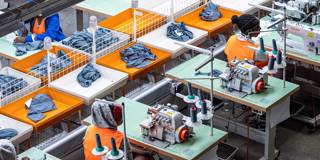 Eyerusalem Jiregna/AFP via Getty Images
Eyerusalem Jiregna/AFP via Getty Images
巨大的服务业错觉
剑桥—正当世界为后新冠时代做准备之际,各国,尤其是于发展中国家而言,对可持续经济增长的需求正变得越来越强烈。作为近几十年来全球增长主要引擎,呼吁这些的国家将其发展战略从工业化转向服务业是很诱人的。得益于新技术,越来越多的服务商品化。一些经济学家甚至建议,低收入经济体应该完全跳过发展的制造业阶段,直接从传统农业转向服务业的新“增长自动扶梯”。
对发展中国家来说,服务业代表着新的圣杯,这一观念的到来实证研究的证实。研究显示,自2000年以来,特别是自2011年以来,服务业的增长速度超过了制造业。而2019冠状病毒病对全球价值链造成的破坏只会强化这种信念。
此外,诸如5G网络和云计算等新技术正在分割服务流程,让外包高薪、高成本的活动变得可行。这些趋势正在推动所谓的“第三次拆分”,一些以前不可交易的服务可以通过这种方式进行交易。随着世界上最大的经济体卷入关税战争并且全球贸易出现急剧下降,许多人认为服务业是最合适的增长和就业引擎,因为它们可以数字化,不太容易受到海关和其他物流壁垒的影响。
https://prosyn.org/mB10alRzh
To continue reading, register now. It’s free!
Register Now
Already have an account?
Log in



剑桥—正当世界为后新冠时代做准备之际,各国,尤其是于发展中国家而言,对可持续经济增长的需求正变得越来越强烈。作为近几十年来全球增长主要引擎,呼吁这些的国家将其发展战略从工业化转向服务业是很诱人的。得益于新技术,越来越多的服务商品化。一些经济学家甚至建议,低收入经济体应该完全跳过发展的制造业阶段,直接从传统农业转向服务业的新“增长自动扶梯”。
对发展中国家来说,服务业代表着新的圣杯,这一观念的到来实证研究的证实。研究显示,自2000年以来,特别是自2011年以来,服务业的增长速度超过了制造业。而2019冠状病毒病对全球价值链造成的破坏只会强化这种信念。
此外,诸如5G网络和云计算等新技术正在分割服务流程,让外包高薪、高成本的活动变得可行。这些趋势正在推动所谓的“第三次拆分”,一些以前不可交易的服务可以通过这种方式进行交易。随着世界上最大的经济体卷入关税战争并且全球贸易出现急剧下降,许多人认为服务业是最合适的增长和就业引擎,因为它们可以数字化,不太容易受到海关和其他物流壁垒的影响。